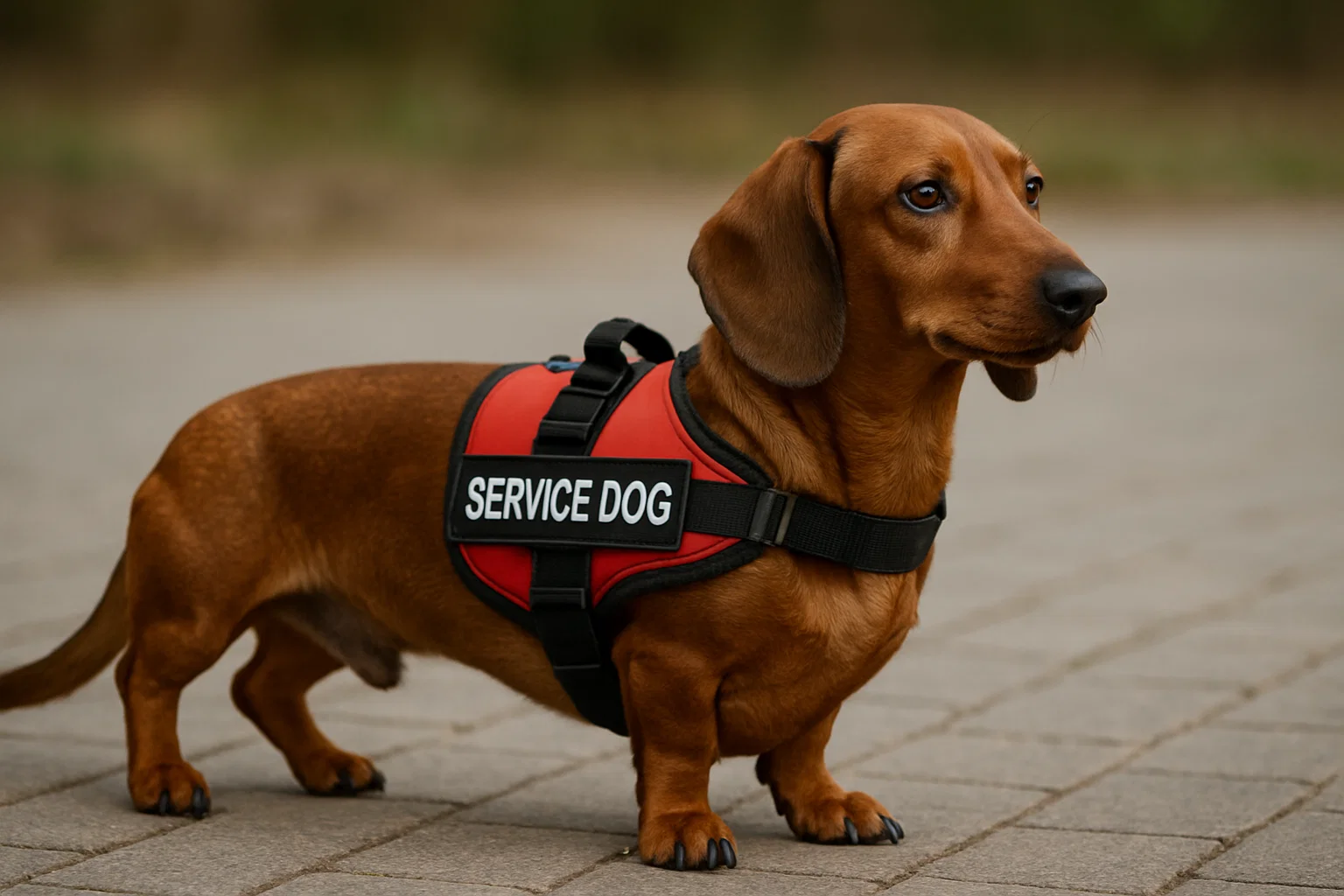Dachshund as a Service Dog

The prospect of using a Dachshund as a service dog may initially seem unconventional due to their distinctive physical characteristics and strong-minded temperament. However, beneath their unique appearance lies a dog with potential for certain types of service work. This article provides an in-depth exploration into the suitability of Dachshunds as service dogs, considering various facets that include their physical attributes, temperament, health considerations, and training capabilities.
Dachshund Overview
Dachshunds are small hounds with a notable elongate body paired with short, sturdy legs, originally bred to hunt and burrow for badgers. They possess a characteristically bold and lively personality, often described as courageous and independent. These traits contribute to both their charm and their potential challenges in service dog roles.
Physical Characteristics
Dachshunds are easily recognizable by their unique physique—elongated, with short legs and a sturdy torso. They typically weigh between 16 to 32 pounds, though standard sizes vary, with miniature Dachshunds being on the smaller end of the spectrum.
The physical attributes of Dachshunds present both advantages and limitations in service work:
- Advantages:
- Portability: Their compact size makes them easily portable, suitable for environments with spatial limitations.
- Agility: Despite their short legs, Dachshunds are agile and can maneuver through tight spaces with ease.
- Limitations:
- Mobility: Their size and shape limit their ability to perform mobility assistance tasks that require strength and stability.
- Durability: The elongated spine is prone to injuries, particularly intervertebral disc disease (IVDD), which can limit their service potential.
Temperament and Attitude
Dachshunds are known for their bold and spirited temperament. They are curious, independent, and sometimes stubborn, reflecting their origins as hunters with a strong sense of smell and determination. Here’s how these traits impact their service dog capabilities:
- Curiosity and Intelligence:
- Positively, these traits make Dachshunds eager to learn and problem-solve.
- Negatively, high curiosity can lead to distractions, which might be challenging to manage in a service setting.
- Independence:
- They can perform tasks without needing constant direction, which is beneficial in service work.
- However, their independent nature can sometimes make them less responsive to commands, necessitating a skilled and patient trainer.
- Adaptability:
- They adapt well to various environments and show resilience, essential for service dogs that accompany handlers in diverse settings.
Types of Service Work
Dachshunds, due to their size and temperament, are most suitable for specific types of service work rather than the full spectrum.
- Emotional Support:
- Their affectionate nature and strong bond with owners make them excellent companions for emotional support roles.
- Psychiatric Service Work:
- They can be trained to provide psychiatric alerts, leveraging their perceptiveness to recognize stress levels or anxiety attacks.
- Medical Alert:
- Dachshunds can be trained for specific task-oriented roles such as alerting to seizures or changes in blood sugar levels, given their keen sense of smell.
Despite these roles, Dachshunds are generally unsuitable for tasks requiring physical support, such as mobility assistance, due to their small stature and potential health vulnerabilities.
Health Considerations
Health is a critical factor when evaluating a Dachshund’s potential as a service dog. They are predisposed to several health issues that impact their long-term functionality and comfort in service roles:
- Intervertebral Disc Disease (IVDD):
- Their elongated spines make them susceptible to spinal injuries, which can result in pain, paralysis, or the inability to perform certain tasks.
- Obesity:
- A common issue due to their small frame, exacerbating back problems and decreasing stamina, essential for active service work.
- Dental Issues:
- They are prone to dental diseases, which require regular vet check-ups and maintenance to ensure overall health.
Ensuring a strict health regimen and regular veterinary check-ups is vital to maintaining a Dachshund’s health and service longevity.
Training and Suitability
Training a Dachshund as a service dog presents unique challenges and opportunities. Their intelligence and eagerness to please can work both for and against the training process.
- Trainability:
- Their intelligence and curiosity make them quick learners for task-specific roles.
- However, their stubbornness can make consistent training sessions necessary to enforce training.
- Focus and Command Adherence:
- Developing their focus is crucial due to their distractible nature in stimulating environments.
- Suitability:
- Trainers must exercise patience and creativity, employing positive reinforcement and continuous socialization from a young age to ensure efficiency.
Dachshunds require experienced trainers who understand their unique personality traits and can work through their stubborn yet intelligent nature.
Summary of Dachshund
In summary, while Dachshunds aren’t suited for all types of service work, they possess unique qualities that can be harnessed effectively for certain roles. Here’s a concise outline of their strengths, weaknesses, and ideal service roles:
- Strengths:
- Affectionate nature makes them excellent for emotional support and companionship.
- Keen sense of smell allows for medical alert capability.
- Adaptability to diverse environments enhances their suitability for fluctuating settings.
- Weaknesses:
- Susceptibility to health issues, particularly spinal problems, limits their physical capabilities.
- Stubbornness may require more patience and tailored training approaches.
- Limited physical support ability due to their size and build.
- Ideal Roles:
- Emotional support animals.
- Psychiatric service work and medical alerts.
By understanding their specific attributes and leveraging their strengths, Dachshunds can fulfill meaningful roles as service animals, providing invaluable assistance and companionship to those in need while maintaining their health and comfort.











